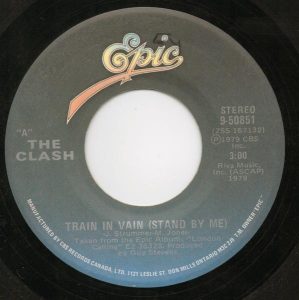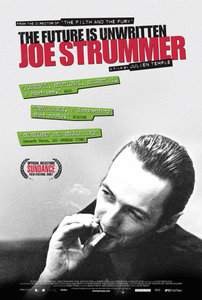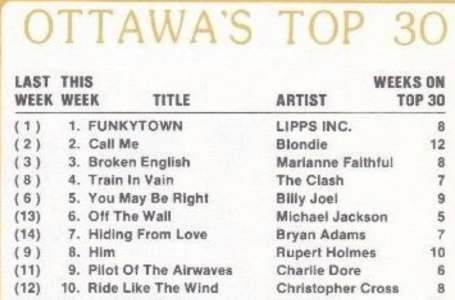#129: Train In Vain by the Clash
City: Ottawa, ON
Radio Station: CFGO
Peak Month: May 1980
Peak Position in Ottawa ~ #4
Peak position in Vancouver ~ #6
Peak Position on Billboard Hot 100 ~ #23
YouTube: “Train In Vain”
Lyrics: “Train In Vain”
The Clash is a band that formed in London (UK) in 1976. John Graham Mellor “Joe Strummer” was born in 1952 in Ankara, Turkey. He began attending a boarding school in London, England, in 1962. He told a reporter years later, “[A]t the age of nine I had to say good-bye to them because they went abroad to Africa or something. I went to boarding school and only saw them once a year after that – the Government paid for me to see my parents once a year. I was left on my own, and went to this school where thick rich people sent their thick rich kids. Another perk of my father’s job – it was a job with a lot of perks – all the fees were paid by the Government.” His brother, David, who also attended the boarding school committed suicide in 1970. This deeply impacted John Mellor. By this time he had been going by the moniker Woody Mellor, with “Woody” a tribute to his hero Woody Guthrie. He was part of a band called the 101ers. By 1975 he took the stage name Joe Strummer.
Strummer left the 101ers in late spring of 1976, and joined The Clash. Strummer was asked to join a new band by Mick Jones and Paul Simonen. Mick Jones was born in 1955 in London, who was raised by his Jewish grandmother. His grandmother, along with her parents, had escaped Russian pogroms in her early childhood. The family moved to England. Jones attended the West London School of Art and Design, thinking that was the way you got to meet people who could form a band. He joined a band called Delinquents. In the spring of 1975, he co-founded protopunk band London SS. Jones was later embarrassed by the band name, as the bandmates hadn’t thought through where SS came from – the Nazi paramilitary squadron known in German as the Schutzstaffel. The SS was responsible for enforcing racial policies, including mandates punishing German Jews. The London SS broke up in early 1976.
Another member of The Clash was Paul Simonen. He was born in 1955 in South London, England. His grandfather was a Belgian refugee who came to England during World War I. After public school, he had attended Byam Shaw School of Art. The manager of London SS, Bernard Rhodes, met Simonen and liked his attitude. Rhodes recommended hiring Simonon due to his attitude and looks, despite Simonon not knowing how to play an instrument. Mick Jones attempted to teach Simonon the guitar but gave up in a matter of hours and asked him to play bass guitar instead. Simonon learned to play bass by playing along to the Ramones first album. Simonon is credited with coming up with the name of the band and was mainly responsible for the visual aspects such as clothing and stage backdrops. Simonon was depicted on the front cover of the band’s double album London Calling in Pennie Smith’s now iconic photograph of him smashing his Fender Precision Bass guitar during a 1979 concert in New York City. This was one of the signature images of the punk era.
Terrence “Terry” Chimes was born in 1956 in the East End of London. He was briefly with the band as a drummer in 1977 and again in 1980 on two of the bands’ studio albums. Keith Levene also was with the band from May to September 1976 on rhythm guitar, but did not appear on any studio recordings. The fourth member of the classic lineup of The Clash was Nicholas Bowen “Topper” Headon. He was born in Bromley, in southeast London in 1955. He was with a psychedelic rock band named Mirkwood in 1973. He joined The Clash in 1977.
Initially, the bandmates had briefly named themselves the Weak Heartdrops and then the Psychotic Negatives. According to Simonon: “It really came to my head when I started reading the newspapers and a word that kept recurring was the word ‘clash’, so I thought ‘the Clash, what about that’ to the others.” The Clash made their first appearance opening for the Sex Pistols on July 4, 1976. In 1977, The Clash signed a record contract with CBS. Their self-titled The Clash reached #12 on the UK album chart, while the debut single, “White Riot”, cracked the Top 40 on the UK Singles chart. In 1978, Give ‘Em Enough Rope reached #2 on the UK pop album chart in the winter of 1978-79.
While the first two albums were certified gold in the UK, their third album London Calling went platinum in both the UK and the USA. It reached #2 on the Swedish album chart, #4 in Norway, and #8 in Finland. The debut single was the title track, “London Calling”, which peaked at #11 on the UK pop chart, #16 in Ireland, and went Top 30 in Australia and New Zealand. Another release from the album was “Train In Vain”.

Originally recorded as a promo single for NME, “Train in Vain” was added last minute to London Calling after the album artwork was finalized. As a result, it was not included in the album track listing and appeared as a hidden track. Sound engineer, Bill Price, told a reporter “Train in Vain was the last song we finished after the artwork went to the printer. A couple of Clash websites describe it as a hidden track, but it wasn’t intended to be hidden. The sleeve was already printed before we tacked the song on the end of the master tape.” As the song title wasn’t originally known, and the lyrics “Train in Vain” do not actually appear in the song, it became popularly referred to in the UK as “Stand By Me”. In North America it was later subtitled “Train In Vain (Stand By Me)”. (“Stand By Me” was already a very well known song title from Ben E. King’s 1961 number-one hit in the USA).
The song title alludes to train journeys that bandmate Mick Jones, who sings lead vocals, used to take across London to see his then girlfriend Viv Albertine, but returning unhappy, in vain. Viv confirmed this in 2009, during an interview for Eccentric Sleeve Notes. “I’m really proud to have inspired that but often he won’t admit to it. He used to get the train to my place in Shepherds Bush and I would not let him in. He was bleating on the doorstep. That was cruel. It’s such an odd title. There’s nothing in it about a train.”
The lyrics seem to be presenting one side of a disagreement between the singer and his lover, a disagreement that caused the breakup. It feels like we are hearing half of a conversation, the singer is talking about the lack of emotional support, while the unheard woman keeps bringing up the importance of financial stability.
The lyrics present the guy telling his lover:
Now I got a job, but it don’t pay,
I need new clothes, I need somewhere to stay.
But without all of these things I can do,
But without your love, I won’t make it through.
But you don’t understand my point of view.
These opening lyrics in “Train In Vain” reference the 1968 Tammy Wynette song “Stand By Your Man”: “You say you stand by your man; Tell me something I don’t understand.”
“Train in Vain” climbed to number-one in Madison (WI), #3 in Philadelphia, #4 in Ottawa, Minneapolis/St. Paul, Phoenix, St. Louis, and Winnipeg (MB), #6 in Vancouver (BC), #5 in Tempe (AZ), #7 in Fredericton (NB), Saskatoon (SK), Richmond (IN), Kansas City (MO), and Regina (SK), #8 in Atlanta, and Monroe (LA), #10 in Toronto, and Montreal, and #11 in Halifax (NS), San Bernardino (CA), and Denver. Internationally, the song peaked at #23 on the Billboard Hot 100 and #26 in New Zealand.
Cover versions of “Train In Vain” have been recorded by Third Eye Blind, Ill Rapture, Motörhead, Dr. Haze/DJ X-Cel, The Sabrejets, Dwight Yoakam, Annie Lennox, The Manic Street Preachers, Stinkfoot in Hollywood, Jones Crusher, Kirsty MacColl, The Computers, Too Much Joy, and others.
The Clash released a non-album single in 1980 titled “Bankrobber” which reached the Top 15 of the pop charts in Ireland, New Zealand and the UK. In 1980, the fourth Clash studio album was released titled Sandinista! It reached #3 in Canada and New Zealand, and the Top Ten on the Norwegian and Swedish album charts. However, the singles released from the album were minor hits.
In 1981, a non-album single titled “This Is Radio Clash” shot to #9 in the Swedish pop chart. The following year the band released Combat Rock. The debut single, “Rock The Casbah”, became their biggest international seller. It peaked at #3 in Australia, #4 in New Zealand, and #8 on the Billboard Hot 100. A re-issue of the song in 1991 climbed to #10 in Ireland and #15 in the UK. A followup single, “Should I Stay or Should I Go”, was a Top 20 hit in 1982 in Ireland and the UK. However, a 1991 re-issue saw the song climb to number-one in the UK, #2 in Ireland and New Zealand, #3 in Belgium, the Netherlands and Norway, #4 in Switzerland, #5 in Austria, Finland and Germany, and crack the Top Ten in Demark, Greece, Portugal and Sweden.
In 1982, Joe Strummer sacked Topper Headon from the band. Headon was addicted to cocaine and other drugs. A concert in Amsterdam was his last chance. Years later he told the Independent “I don’t know I’m being tested, do I? I don’t know it’s my last chance,” he laughs, “and I’m running round trying to score coke. They’re all sitting in the dressing-room, combing their hair in the mirror against the wall and I run in and go: ‘Can I use the mirror?’ His bandmates watched in silence as he placed the mirror on the floor and knelt beside it, chopping out generous lines of cocaine.” When the band returned to London, Joe Strummer told a reporter The Clash had sacked their drummer Headon for being ‘a junkie.’
In September 1983, Mick Jones was fired from the band. He became one of the members of the newly formed General Public, and was in the studio for that band’s debut release All The Rage. The album featured the hit single “Tenderness”.
In 1985, a song about the state of England at the time titled “This Is England”, reached #13 in Ireland, #16 in Sweden, and #24 in the UK. It was the debut single from the Clash’s sixth and final studio album Cut the Crap. The Clash disbanded in 1986. The Clash has released two live albums, the latest in 2008 Live at Shea Stadium which was from a concert performance in 1982.
While The Clash dissolved, Mick Jones formed Big Audio Dynamite. Jones and Joe Strummer worked together on their respective 1986 projects. And Mickk Jones helped with the two songs Strummer wrote and performed for the soundtrack to the film about Sid Vicious and his girlfriend Nancy Spungen called Sid and Nancy. In 1986 Simonen formed a band named Havana 3am. Topper Headon released a solo album Waking Up. Though in 1987 Headon was imprisoned on drug related offenses. During the late 1980s, Headon drove mini-cabs to finance his heroin addiction, and later busked on the London Underground with bongo drums.
Joe Strummer had a backing band named The Latino Rockabilly War. The band toured with Strummer on the Rock Against The Rich Tour in 1988. Strummer also appeared in a series of films. These include a spaghetti western parody titled Straight to Hell (1987), and postmodern film Walker. Both of these Strummer scored music for the films. In 1988 he was in a road movie titled Candy Mountain, and in Mystery Train (1989) where he plays Johnny ‘Elvis,’ I Hired a Contract Killer (1990) where he plays a guitarist.
In 2000, the Clash were the subject of a documentary titled The Clash: Westway to the World. The film won a Grammy Award for Best Long Form Music Video.
In March 2003, The Clash were inducted into the Rock and Roll Hall of Fame. But before this happened, on December 22, 2002, Strummer died from a congenital heart defect, ending any possibility of a full reunion. He was fifty years of age. Prior to his death, Joe Stummer had a backing band formed in 1999 named The Mescaleros. In their brief life from 1999 to 2002, the band released three studio albums. In 2007, a documentary was released titled Joe Strummer: The Future Is Unwritten.

In 2008, Mick Jones formed a band called Carbon/Silicon. In late 2011 he collaborated with the Justice Tonight Band. He has also been a producer.
Paul Simonen appeared in the 1988 Bob Dylan album Down in the Groove. Simonen and Mick Jones were both members of the virtual band Gorillaz. Intermittently between 2005 and 2019, Paul Simonen was in The Good, the Bad & the Queen. In 2023, he collaborated with Gavin Ayers to release the album Can We Do Tomorrow Another Day? Between 1996 and 2015, Simonen has been featured in nine exhibitions – some solo and some group.
September 5, 2025
Ray McGinnis
References:
“Strummer’s lasting culture Clash,” BBC, December 23, 2002.
Nick Wells, “The bouncers wouldn’t let the audience stand up. That frustrated me to the point that I destroyed my bass guitar”: The Clash’s Paul Simonon reflects on that iconic London Calling moment,” Guitar World, May 7, 2024.
“‘I forgive you’: The Clash’s drummer Topper Headon makes peace with the man who sacked him,” Independent, June 28, 2009.
Ari Surdoval, “Stay Free: Mick Jones Looks Back at The Clash,” Gibson, December 2006.
Annie Lennox, “Train In Vain“, RCA, 1995.
Dean Mayo Davies, “From punk rock to painting: Dean Mayo Davies visits the musician-turned-artist at his west London studio,” Another Man, December 6, 2017.

CFGO 1440-AM Ottawa Top Ten | May 12, 1980

Leave a Reply